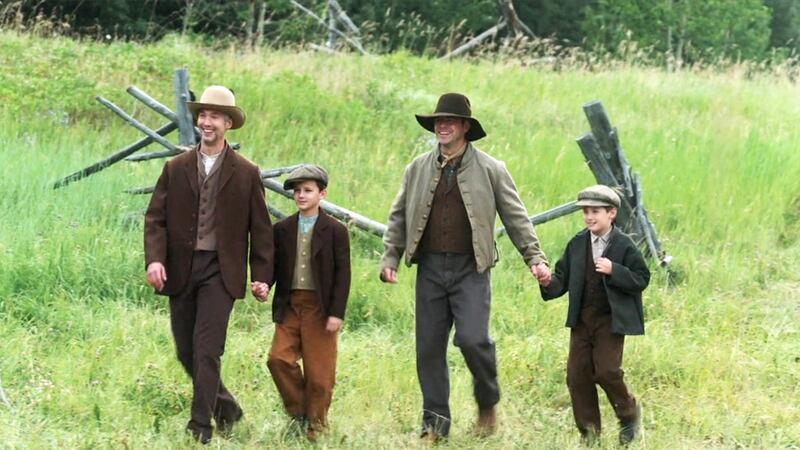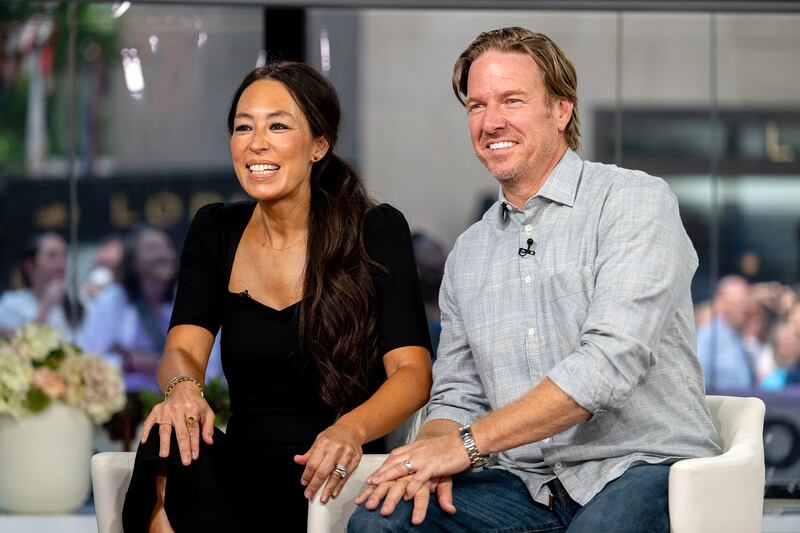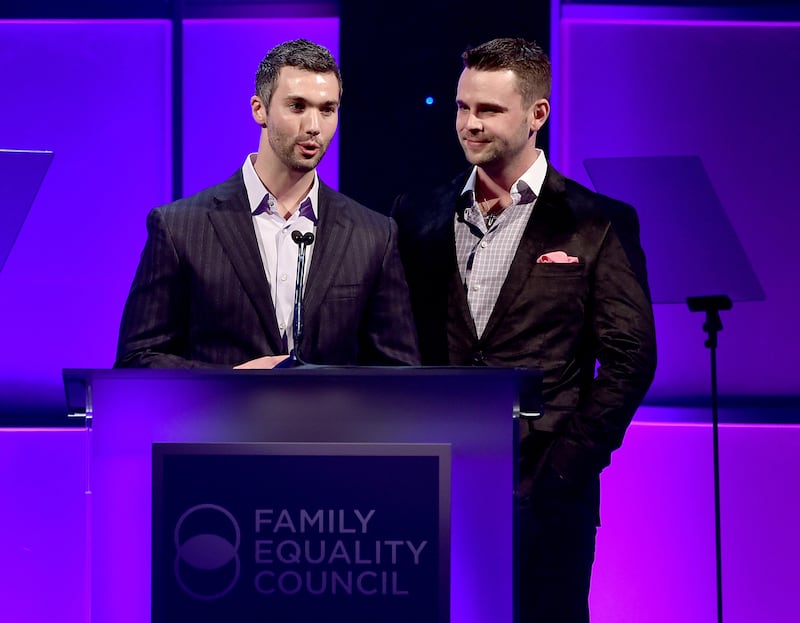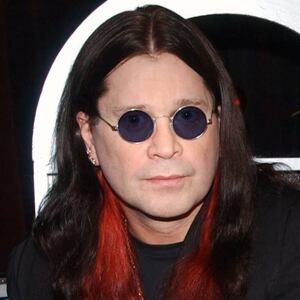As all homesteaders know, there were a plethora of threats pioneers could encounter when settling the land in the 1880s: wild animals, drought, bitter cold, sickness, and of course, the occasional errant homosexual.
Wait. Apologies.
That last one is a concern of logged-on evangelicals, currently watching the Magnolia Network and HBO Max joint venture, Back to the Frontier.
The currently airing reality series, produced by Chip and Joanna Gaines—new episodes run through the end of August—follows three families as they divorce themselves from 21st century comforts and embark on a social experiment that thrusts them into the life of a 19th century homesteader.

For eight weeks, families are expected to work the land and get “back to basics.” However, some regular viewers of Magnolia Network’s fare were dismayed with the casting. One of the three families plopped onto the range for the summer features a same-sex couple, with their “device-obsessed” twin boys in tow.
In the two weeks since the series’ July premiere, a swell of backlash against the same-sex couple has come for the Fixer Upper duo who helped found the Magnolia Network. The Gaines family, as popular for their attachment to the divisive Antioch church as they are for their hit show Fixer Upper, executive produced the series, overseeing the show’s development.
While Magnolia Network is owned and managed by Discovery, that hasn’t stopped evangelical viewers from voicing their anger with the Gaineses, kicking off a battle of Bible verses between Chip Gaines, evangelical leaders, and the pastor of the infamous Antioch church, to which the Gaines family belongs.
But what is most fascinating about this most recent rendition of evangelicals doing their best Valerie Cherish impression, the majority of the fighting seems to be coming from inside the church. In response to the criticisms, Chip Gaines launched a retort, taking modern American Christians to task over their knee-jerk judgment.

Take Me Back to God’s Country
On July 10, HBO Max launched its new reality series, putting three couples and their families out in “homestead territory.”
Stripped of all basic comforts, from jewelry and makeup to running water and electricity, the families are given eight weeks to fully secure their home, establish a successful farm, and stock their pantries for the winter. There is no explicit prize for the winner—in a world of grand prizes and cash money, the victory here is a moral and personal one.
A prevailing theme of the first two episodes is that, back in the day, one in three families could not handle the rigmarole of homestead life and would ultimately leave or lose their land. Determined to make the situation work, the modern-day families work together, alongside the other contestants, to establish a community that helps them self-sustain and create something “simpler” than the times we live in.
One family in the trifecta is captained by Joe Riggs and Jason Hanna, a Dallas-based couple who inherits a bare-bones cottage that noticeably lacks the iPads, video games, or white noise machines that make their boys tick.
While Joe and Jason’s on the show has become a headline-making news story, if you watch the series, you’ll notice that none of the participants seem to have any issue with the identities of any of the couples. They’re understandably pretty busy with building a fourth wall for their unfinished home. Crazy how priorities shift when you don’t have the time to care.
And when it comes to whether Joe and Jason show any same-sex affection that might put off pearl-clutching viewers, it’s worth noting that the show really leans into the ilk of Magnolia Network offerings: None of the families are overly touchy or political, which makes sense because after a day of farm tending and light construction, who has the energy?
For any objective viewer watching the series, the most controversial thing the Riggs-Hanna family considers is whether they should have used a portion of their 30 dollar allowance to buy luxury items including a deck of cards and almonds.

No Homo on the Range
Backlash ensued almost immediately following the premiere. Fans of the Magnolia brand took to social media to express their disappointment.
Eventually, as complaints mounted, evangelical leaders like Franklin Graham chimed in, voicing his disappointment and arguing that marriage is between one man and one woman. Joel Berry, who is editor of conservative Christian satire site Babylon Bee, said he was just “sad” and “can’t let my kids watch your show now, since I’m trying to protect their eyes and hearts from the lies of the world.”
Again, not to belabor the point, but this is the reaction that online Christians have after seeing two men, with their two children, struggle against the hardships of settling land in what may be one of the most sanitized reality shows currently on air. Even The Great British Bake Off has more inappropriate jokes. At what point does it become indisputable that the argument is really: keep these queers off my TV and out of my life entirely.
The twist, however, was that three days after the premiere (in classic rise-from-the-tomb fashion), Chip Gaines entered the chat with a retort to those disappointed in the Gaines family: “Talk, ask qustns [sic], listen.. maybe even learn. Too much to ask of modern American Christian culture. Judge 1st, understand later/never. It’s a sad sunday [sic] when “non believers” have never been confronted with hate or vitriol until they are introduced to a modern American Christian.”
The response piqued the interest of the larger evangelical base online, drawing responses from religious leaders, evangelical influencers, and famed fifth-place swimmer and right-wine rabblerouser, Riley Gaines.
The backlash has even prompted the Gaines’ pastor, Jimmy Seibert, to post his own interestingly-timed, vague, yet friendly explanation of where Antioch church stands on same-sex marriage, which is essentially: love the sinner, hate the sin.

Battle of the Better Christians
The response from Chip Gaines speaking out has largely quieted since his last post on July 13, when he quote-tweeted himself from 2016, citing his own words, “in times of trouble, you’ll find the Gaines family at church.”
The tweet followed a viral BuzzFeed article in 2016 that looked into the lack of LGBTQ representation on Fixer Upper. The fact that the quote was used in that controversy makes the use of the tweet to further address the situation with Back to the Frontier even more poignant.
The line between the Magnolia brand and the Magnolia Network can be fuzzy, if not entirely indistinguishable.
The Magnolia Network, which launched as a rebrand of a former HGTV property, is partly the brainchild of Chip and Joanna Gaines, alongside Discovery. The name comes from the Gaines’ lifestyle brand, Magnolia, which developed from their wildly successful HGTV show, Fixer Upper. And while HGTV has remained largely neutral from political conversations around the couple, Chip and Joanna Gaines’ brand is one that has always been attached to their faith.
But what makes this battle so interesting is that in these online tiffs about community, representation, and religion, we almost always see a party line from evangelicals about faith and family and an argument for equality and respect coming from the side of the aggrieved, but this time, the call is coming from inside the church, with both sides citing Bible verses in a war of semantics.
On July 13, Gaines quoted 1 Peter 3:15 as a retort to a detractor who lists the same Bible verse in his bio on X:
“But in your hearts revere Christ as Lord. Always be prepared to give an answer to everyone who asks you to give the reason for the hope that you have. But do this with gentleness and respect.”
Seeing such a prominent figure in the non-denominational Christian community arguing in favor of acceptance and tolerance is… heartening, if not entirely shocking, in 2025.
LGBTQ people can argue—in person or online—until they’re blue in the face, and often do, in hopes of breaking through to detractors who cite religion as a reason for being anti-LGBTQ, but to see that same fight being taken up by someone within the church makes it a conversation worth fighting for.
As evangelicals are reckoning with who and what their faith is aligned with, politically or otherwise, having a prominent Christian cite Biblical texts to dispel bigoted arguments is a seemingly wild change of heart for the Gaines crew.
And for queer HGTV lovers—and we love our home improvement shows—it’s even more shocking, seeing the charismatic couple come around nearly a decade after having their brand rocked by the reveal that Fixer Upper appeared to box out queer people.
But that’s what’s made this all such a spectacle. Social media is largely just noise at this point, fueled by one side screaming the same vitriol at each other.
If Riley Gaines or Jon Root don’t have someone to yell back at them, do they really exist? The closest hope we have to a fruitful conversation about Back to the Frontier or otherwise is when prominent voices from the “same side,” for lack of a more nuanced descriptor, speak up against one another. To do so by citing the verses and tenets of the book that allegedly guides the decisions of evangelical Christians? In the South, we call that the Lord’s work.
At the conclusion of Episode 2, Joe and Jason’s family seems to be willing to stick out the trials and tribulations that come with eating canned ham and using an outhouse. The full season is already filmed, so if they don’t make it to the end of the summer, rest assured it’s because they threw in the hoe and shovel on their own accord—not because of internet discourse.

As for the fate of Back to the Frontier, it’s difficult to imagine HBO Max removing the series because of the backlash, but Gaines’ response has created an impactful, if not small, moment in the evangelical discourse: Perhaps instead of hitting Twitter, it’s worth cracking open that book so many Christians reference haphazardly.
And if they’re not interested in thumbing through their own sacred text, then at least take a cue from the show itself and log the fuck off for a while. It’s what Jesus would probably do.









